Information/Write-up
Transcribed Jan 12, 2025:
'CANADA REMEMBERS' 'LE CANADA SE SOUVIENT'
THE CENTRAL BAND OF THE CANADIAN FORCES
LA MUSIQUE CENTRALE DES FORCES CANADIENNES
Director of Music: Major Denis Bouchard, CD
Directeur de Musique: Major Denis Bouchard, CD
AIR FORCE OVERTURE (5.13)
a. The Dam Busters March (Coates) Chappell Music
b. Royal Air Force March Past (Davies, Dyson) Public Domain
c. Airman's Prayer
VERA LYNN MEDLEY (7.00)
a. Pack Up Your Troubles (Asaf, Powell) F.D.H.
b. The White Cliffs Of Dover (Kent, Burton) B. Feldman
c. Wish Me Luck As You Wave Me Goodbye (Parr, Davis) Chappell
d. We'll Meet Again (Parker, Charles) E.M.I. Music
MARCH: JE ME SOUVIENS (3.21)
(J.G.E. Gagnier) Copyright Control
'BLESS 'EM' ALL' MEDLEY (4.47)
a. I Don't Want To Join The Army (Trad. arr. E. Ford) Copyright Control
b. I've Got Sixpence (Box, Cox, Hall) Chappell Music
c. Captain Of The Clouds (J. Mercer) Warner Bros.
d. I Belong To Glasgow (Lauder) E.M.I. Music
e. Bless 'Em All (Hughes, Lane) K.P.M.
f. Roll Me Over (Trad arr. E. Ford) Copyright Control
g. The White Cliffs Of Dover (Kent, Burton) B. Feldman
h. She Wore A Yellow Ribbon (Trad. arr. E. Ford) Copyright Control
NEVER AGAIN (4.08)
(Ms Robin Moir) Copyright Control
THE NORMANDY LANDING (MEDLEY) (4.30)
a. Heart of Oak (Arne) Public Domain
b. Bonnie Dundee (Trad) Public Domain
c. El Abanico (Javaloyes, Lopez) Public Domain
d. British Grenadiers (Trad) Public Domain
e. The Buffs (Trad) Public Domain
f. Whistle O'er The Lave O'T (Trad) Public Domain
g. Bonnie Dundee (Trad) Public Domain
h. Sambre et Meuse (Rauski) Public Domain
i. Bonnie Dundee (Trad) Public Domain
j. Atholl Highlanders (Trad) Public Domain
k. The Piobaireachd of Donald Dhu (Trad) Public Domain
l. Old Solomon Levi (Trad) Public Domain
m. Lutzow's Wild Hunt (Trad) Public Domain
n. Blue Bonnets Over The Border (Trad) Public Domain
o. RAF March Past (Davies, Dyson) Public Domain
SALUTE TO THE BIG BANDS (8.21)
a. In The Mood (Garland, Razaf) Peter Maurice
b. Sing, Sing, Sing (Prima) E.M.I. Music
c. What's New (Haggart, Burke) B. Feldman, Memory Lane Music
d. Chattanooga Choo-Choo (Warren, Gordon) Warner Chappell
e. Take The 'A' Train (Strayhorn) Campbell Connelly
MARCH: CANADA OVERSEAS (2.41)
(James M. Gayfer) Copyright Control
NIGHTFALL IN CAMP (3.13)
(D.A. Pope) D.A. Pope
MARCH ATHENE (1.20)
(E.R. Hinchley) Copyright Control
SEVEN SEAS OVERTURE (5.17)
(Arr. E. Fralick) Copyright Control
LILI MARLENE (1.00)
(Schultz) Peter Maurice
The Honourable Lawrence MacAulay, Secretary of State (Veterans), on November the 9th 1993 launched CANADA REMEMBERS, a national program beginning in 1994 to commemorate the 50th anniversary of events leading to the end of the Second World War.
Introduction by Colonel John Gardam (Retired), OMM, CD who is the Department of National Defence Project Director for Canada Remembers, a Department of Veterans Affairs program.
"Music, be it martial, sung with a choir or just a sing-song has always had its place in the military profession. The Second World War had its favourite singers be it the 'Sweetheart of the Forces' Vera Lynn or some other person whose name became synonymous with patriotic songs. This compact disc, produced at a time when the nation celebrates CANADA REMEMBERS is most appropriate for it brings back the memories of wartime 1939-1945 with its victories, its sadness and the evolution of Canada into a world class nation. The Central Band of the Canadian Forces have chosen their music well to please both young and old."
John Gardam
Le 9 novembre 1993, l’honorable Lawrence MacAulay, secrétaire d’Etat (Anciens combattants), donnait le coup d’envoi à un programme national appelé « LE CANADA SE SOUVIENT » qui débutera en 1994 pour commémorer le 50e anniversaire des événements qui ont mené à la conclusion de la Seconde guerre mondiale.
Avant-propos par le colonel (Retraité) John Gardam, OMM, CD, directeur de projet au ministère de la Défense nationale et, à ce titre, représentant du Ministère auprès de l’équipe du programme « Le Canada se souvient », dirigé par le ministère des Anciens combattants.
"The Normandy Landing March Medley" is a potpourri of the regimental marches of the ground and airborne troops, and the naval and air forces that supported their landing on the occupied French soil on June 6th – "D-Day". The following list is in order of precedence. Note that the unit marches are presented as they existed at the time.
a. Royal Canadian Navy – Heart of Oak
b. 1st Hussars (London, Ontario) – Bonnie Dundee
c. Fort Garry Horse (Winnipeg) – El Albanico
d. Sherbrooke Fusiliers (27th Armoured Reg.) – no regimental march at that time
e. Royal Canadian Artillery (12th, 13th, 14th & 19th Regiments and the 3rd Anti Tank Regiment) – British Grenadiers
f. The Queen's Own Rifles of Canada – The Buffs
g. The Highland Light Infantry of Canada – Whistle o'er the Lave O'T
h. The Stormont, Dundas and Glengarry Highlanders – Bonnie Dundee
i. Le Régiment de la Chaudière – Sambre et Meuse
j. The North Shore (New Brunswick) – Bonnie Dundee
k. The North Nova Scotia Highlanders – Atholl Highlanders
l. The Cameron Highlanders of Ottawa – The Piobaireachd of Donald Dhu
m. The Royal Winnipeg Rifles – Old Solomon Levi
n. The Regina Rifle Regiment – Lutzow's Wild Hunt
o. The 1st Battalion Canadian Scottish Regiment – Blue Bonnets Over The Border
p. The 1st Canadian Parachute Battalion – no regimental march at that time
q. The Royal Canadian Air Force – RAF March Past
The "Salute to the Big Bands" presents popular selections from the Second World War era. Arranged by Jim McGrath and Sergeant Steve Emberson, this Salute begins with the famous "In The Mood" and leads into "Sing Sing Sing". The first featured soloist is Sergeant Bruno Drolet on euphonium playing "What's New". "Chattanooga Choo Choo" features Ottawa singer and song writer Ms. Robin Moir on lead vocals and the background vocals of Warrant Officer Robin Habermehl, Sergeant Steve Emberson and Sergeant Ken Fahie. The Salute closes with the ever-popular "Take The 'A' Train" with a tenor saxophone solo by Warrant Officer Robin Habermehl.
Major James M. Gayfer (ret'd), composer and Army band director, composed "Canada Overseas" while stationed in England during the Second World War. This composition was used, within the context of the North American Treaty Organisation (NATO) as the official march of Canadian Forces Europe.
"Nightfall In Camp" was arranged by the late Lieutenant Colonel D.A. Pope, Director of Music of the Coldstream Guards from 1944 to 1963. As director of the Royal Army Service Corps, Colonel Pope earlier toured Sicily and Italy playing to many Canadian and American troops. The arrangement is based on the tune "Sandon" composed by Charles Henry Purday for the hymn "Lead Kindly Light", and the infantry Last Post – the penultimate duty call.
"March Athene" was composed by E.R. Hinchley and was used as the official march of the Canadian Women's Army Corps. The march was named for Athena, goddess of civilisation and wisdom. She was fully armed and independent whether on the battlefield or in the city, had divine intelligence and personified the inner wisdom of the heroes she protected and guided.
The "Seven Seas Overture" was arranged by Earl Fralick in 1980 for the famed Nova Scotia International Tattoo. This tribute to all sailors includes; We are the Navy, Britannia-Pride of the Ocean, Drunken Sailor, Eternal Father, Heart of Oak, Roll along Wavy Navy, North Atlantic Squadron, All The Nice Girls Love a Sailor and Blow The Man Down.
"Lilli Marlene", composed by Norbert Schultz and arranged by Harry Pinchin, was introduced to British troops during the North African campaign where it was sung by captured German prisoners. Its haunting melody originally created the appeal. Apparently, the English lyrics were commissioned by the British Government in order to avoid any hint of sympathy for the enemy. As a result, the song's popularity grew even more.
The "Closer Medley" was arranged by local Ottawa musician Mark Ferguson especially for this recording. This presentation of commemorative music in the form of hymns and prayer is associated with and well loved by those who served in the three service elements: sea, land and air. The first section is the "Eternal Father" dedicated to the men and women who served in the Royal Canadian Navy and the Merchant marine. The second section is dedicated to those who served in all branches of the Canadian Army. The hymn "The Day Thou Gavest O Lord Is Ended" begins with Sergeant John H. MacDonald (The Cameron Highlanders of Ottawa) on bagpipes and ends with the full concert band. The last section "Airman's Prayer" is sung and narrated by longtime vocalist of the Central Band, Master Warrant Officer Don Laver (ret'd).
"God Save The Queen" was the national anthem of Canada from Confederation until 1980, when it was replaced by "O Canada".
"O Canada" was composed by Calixa Lavallée in 1880 as a French Canadian National song. The English lyrics as they are known today were added in 1908 by Stanley Weir. The national song "O Canada" replaced "God Save The Queen" as the national anthem in 1980, and since that time an official bilingual version has been widely used.
En 1989, la Musique centrale a demandé à Morley Calvert de faire l'arrangement de l'« Air Force Overture » pour harmonie de concert. Cette pièce, qui reprend les accents de « Dam Busters », « Royal Air Force March Past » et « Airman's Prayer », vous permet d'apprécier la richesse sonore de l'orchestre.
Le « Vera Lynn Medley » est une compilation de mélodies réalisée par plusieurs membres de la Musique du Commandement aérien, à Winnipeg (Manitoba). Surnommée « l'idole des Forces canadiennes », Vera Lynn mérite bien l'hommage que nous lui rendons aujourd'hui. La belle voix de Mme Robin Moir est mise à l'honneur et nous rappelle celle de Vera Lynn ainsi que les chansons nostalgiques de l'époque.
« Je me souviens » a été composé par le lieutenant J.G.E. Gagnier (à la retraite), autrefois directeur de la Musique du Corps royal canadien, des magasins militaires. Empruntant son titre à la devise du Québec, cette marche rend hommage à ceux qui se sont battus et qui ont donné leur vie pour la libération de leurs terres ancestrales.
« Bless 'em All » est un pot-pourri de chansons et de ballades qui étaient très populaires tant au Canada que sur les lignes de front. On reconnaîtra les thèmes de « I Don't Want to Join the Army », « Sixpence », « Captain of the Clouds », « Glasgow », « Bless 'em All », « Roll Me Over », « The White Cliffs of Dover » et « She Wore a Yellow Ribbon ». L'arrangement est d'Eric Ford.
« Never Again » a été composé par Mme Robin Moir, chanteuse bien connue d'Ottawa, et arrangé par le sergent Steve Emberson. Mme Moir, dont le père a servi dans le Premier Bataillon de service spécial et s'est battu à Anzio, a écrit cette chanson pour un film réalisé par Les Amputés de guerre du Canada. Cet organisme parraine des programmes de rééducation pour les personnes atteintes d'un handicap physique. La chanson « Never Again » est sortie en même temps qu'un vidéo destiné aux écoles et donnant un aperçu de ce qu'a été la participation du Canada à la Première et à la Seconde Guerres mondiales et au conflit de Corée.
« The Normandy Landing March Medley » est un pot-pourri des marches régimentaires des troupes terrestres et aéroportées qui ont débarqué en sol français occupé, le 6 juin 1944 (le « jour J ») ainsi que des forces navales et aériennes qui ont appuyé ce débarquement. Voici la liste des marches régimentaires, par ordre de préséance. Il convient de remarquer qu'elles sont présentées telles qu'elles existaient à l'époque.
a. La Marine royale canadienne – Heart of Oak
b. 1st Hussars (London, Ontario) – Bonnie Dundee
c. The Fort Garry Horse (Winnipeg) – El Albanico
d. The Sherbrooke Fusiliers Regiment (27e Régiment blindé) – aucune marche régimentaire à l'époque
e. L'Artillerie royale canadienne (12e, 13e, 14e et 19e Régiments et 3e Régiment antichars) – British Grenadiers
f. The Queen's Own Rifles of Canada – The Buffs
g. The Highland Light Infantry of Canada – Whistle o'er the Lave O'T
h. The Stormont, Dundas and Glengarry Highlanders – Bonnie Dundee
i. Le Régiment de la Chaudière – Sambre et Meuse
j. The North Shore (New Brunswick) Regiment – Bonnie Dundee
k. The North Nova Scotia Highlanders – Atholl Highlanders
l. The Cameron Highlanders of Ottawa – The Piobaireachd of Donald Dhu
m. The Royal Winnipeg Rifles – Old Solomon Levi
n. The Regina Rifle Regiment – Lutzow's Wild Hunt
o. The Canadian Scottish Regiment (1er Bataillon) – Blue Bonnets Over the Border
p. Le 1er Bataillon canadien de parachutistes – aucune marche régimentaire à l'époque
q. L'Aviation royale du Canada – RAF March Past
Le « Salute to the Big Bands » présente des succès de l'époque de la Seconde Guerre mondiale. Arrangé par Jim McGrath et le sergent Steve Emberson, cet hommage reprend d'abord le célèbre « In The Mood » et enchaîne avec « Sing Sing Sing ». Le premier solo est exécuté par le sergent Bruno Drolet, au flugelhorn. « Chattanooga Choo Choo » est interprété par la chanteuse et compositeur d'Ottawa Mme Robin Moir, accompagnée d'un chœur formé par l'adjudant Robin Habermehl, le sergent Steve Emberson et le sergent Ken Fahie. Le pot-pourri se termine par l'immortel « Take the "A" Train », avec un solo de saxophone ténor exécuté par l'adjudant Robin Habermehl.
« Canada Overseas » Le major James M. Gayfer (à la retraite), compositeur et directeur de musique de l'Armée, a écrit « Canada Overseas » alors qu'il était stationné en Angleterre durant la Seconde Guerre mondiale. Cette composition a été adoptée comme
« Nightfall in Camp » a été arrangé par le défunt lieutenant-colonel D.A. Pope, directeur de musique des Coldstream Guards de 1944 à 1963. À titre de directeur du Royal Army Service Corps, le colonel Pope avait effectué des tournées en Sicile et en Italie, se produisant devant de nombreuses troupes canadiennes et américaines. L'arrangement s'inspire de l'air « Sandon », composé par Charles Henry Purday pour l'hymne Lead Kindly Light, et du « dernier appel » de l'infanterie.
« March Athene » a été écrit par E.R. Hinchley et allait devenir la marche officielle du Service féminin de l’Armée canadienne. Déesse grecque de la civilisation et de la sagesse, Athéna était tout armée et indépendante autant dans la cité que sur les champs de bataille. D'une intelligence divine, elle personnifiait la sagesse des héros qu'elle protégeait et guidait.
« Seven Seas Overture » a été arrangé par Earl Fralick en 1980, pour le célèbre tattoo international de la Nouvelle-Écosse. Cet hommage à tous les marins comprend We are the Navy, Britannia - Pride of the Ocean, Drunken Sailor, Eternal Father, Heart of Oak, Roll along Wavy Navy, North Atlantic Squadron, All the Nice Girls Love a Sailor et Blow the Man Down.
Composée par Norbert Schultz et arrangée par Harry Pinchin, la chanson « Lilli Marlene » a été présentée aux troupes britanniques durant la campagne nord-africaine; ce sont des prisonniers allemands qui la chantaient. Sa mélodie obsédante est à l'origine de son charme. On dit que le texte anglais a été commandé par le gouvernement britannique, qui voulait éviter que ne paraisse toute trace de sympathie envers l'ennemi. La chanson a par la suite gagné en popularité.
Mark Ferguson, musicien d'Ottawa, a fait l'arrangement de « Closer Medley » spécialement pour cet enregistrement. Sous forme d'hymnes et de prières, cette compilation de chansons favorites évoque tous ceux et celles qui ont servi dans l'un de trois éléments (Terre, air, mer). La première partie, Eternal Father, est dédiée aux hommes et aux femmes qui ont servi dans la Marine royale du Canada et dans la Marine marchande. La deuxième partie est dédiée aux membres de toutes les branches de l'Armée canadienne. L'hymne The Day Thou Gavest O Lord Is Ended débute avec le sergent John H. MacDonald (The Cameron Highlanders of Ottawa) à la cornemuse et se termine avec toute l'harmonie. Enfin, l'adjudant-maître Don Laver (à la retraite), longtemps chanteur pour la Musique centrale, a prêté sa voix pour la troisième partie, Airman's Prayer.
« God Save the Queen » a été l'hymne national du Canada à compter de la Confédération jusqu'en 1980, année où il fut remplacé par « Ô Canada ».
« Ô Canada » a été composé par Calixa Lavallée en 1880; c'était à l'époque un chant national canadien français. C'est à Adolphe-Basile Routhier que l'on doit le texte original en français. Le texte anglais que nous connaissons aujourd'hui a été ajouté en 1908 par Stanley Weir. « Ô Canada » a remplacé « God Save the Queen » et est devenu officiellement l'hymne national du Canada en 1980; depuis ce temps, une version bilingue officielle est couramment utilisée.
THE CENTRAL BAND OF THE CANADIAN FORCES
The Central Band of the Canadian Forces, under the command of Major Denis Bouchard, is stationed at Canadian Forces Base Ottawa, Canada. Since its inception in 1939, it has developed a reputation as one of Canada's finest musical organisations. Within the Band, there are six essential ensembles including: the Symphonic concert Band, the Ceremonial Band, the Canadian Forces String Ensemble, the "Ambassador's" Stage Band, the Heraldic Fanfare Trumpets and the Dance Combo "Free Flight." These ensembles are regularly called on to provide musical support for many State and Ceremonial functions in the Nation's Capital. In addition, the Central Band also travels extensively throughout the various regions of Canada, the United States and Europe.
The Central Band of the Canadian Forces performs a variety of music, ranging from the classics to the latest top 40 hits, providing a showcase of Canadian talent and a glimpse into the Canadian Forces seldom seen by the public. Its reputation is well deserved as one of Canada's finest musical organisations.
LA MUSIQUE CENTRALE DES FORCES CANADIENNES
Sous la direction du major Denis Bouchard, la Musique centrale des Forces canadiennes est stationnée à la Base des Forces canadiennes Ottawa, au Canada. Depuis sa création en 1939, la Musique s'est taillée une place enviable parmi les formations musicales les plus réputées au Canada.
La Musique comporte essentiellement six ensembles: l’Harmonie de concert, la musique de cérémonie, l’Ensemble à cordes des Forces canadiennes, l’Ensemble de jazz, les Trompettes héraldiques et l’Orchestre de danse. Ces ensembles sont appelés régulièrement à contribuer à de nombreux événements d’État et cérémonies à la capitale nationale. En outre, la Musique centrale voyage fréquemment dans les diverses régions du Canada, aux États-Unis et en Europe.
Les ensembles de la Musique centrale interprètent un large éventail de répertoires allant des grands classiques aux plus récents succès populaires, mettant en valeur les talents des musiciens canadiens et offrant au public un rare aperçu des Forces canadiennes. Son excellence musicale lui vaut une réputation enviable.
MAJOR DENIS BOUCHARD, CD – DIRECTOR OF MUSIC
Major Denis Bouchard, CD, began his musical studies at the Conservatoire de musique de Québec, in Québec City. These studies led him to join the Canadian Forces in 1972 as a musician. After a variety of career courses, he received his commission in 1980. Since that time, he has held various senior appointments within the Band Branch; namely, as Commanding Officer of the Royal 22nd Regiment Band from 1986 to 1990 and various staff positions at National Defence Headquarters (NDHQ) Ottawa within the Directorate of Ceremonial (DC). In July 1992, Major Bouchard was appointed Commanding Officer and Director of Music of the Central Band of the Canadian Forces.
MAJOR DENIS BOUCHARD, CD – DIRECTEUR de MUSIQUE
C'est au Conservatoire de musique de Québec que le major Denis Bouchard, CD, entreprend ses études musicales. Il se joint ensuite aux Forces canadiennes en 1972 à titre de musicien. Après avoir suivi des cours de qualification, il reçoit son brevet d'officier en 1980. Il occupe par la suite divers postes supérieurs au sein de la Branche des services de musique, dont celui de commandant de la musique du Royal 22e Régiment de 1986 à 1990, et plusieurs postes d'état-major au Quartier général de la Défense nationale (QGDN), à Ottawa, au sein de la Direction du cérémonial (DC). Le major Bouchard devient directeur de musique et commandant de la Musique centrale des Forces canadiennes en juillet 1992.
Director of Music
Major Denis Bouchard CD
Associate Director of Music
Captain Jacques Destrempes CD
Assistant Director of Music
Chief Warrant Officer Sam Rinella CD
Flute
Warrant Officer Doug Thomas CD (lead)
Sergeant Janet Geiger
Corporal Emily Englee
Oboe
Sergeant Pierre Cayer (lead)
Clarinet
Sergeant Frederic Hodgson
Master Warrant Officer Mike Leggio CD
Sergeant Bob Blight CD
Sergeant Dave Devisser CD
Sergeant Gilles Dumouchel CD (lead)
Sergeant Jocelyn Fortin
Sergeant Michel Lacroix CD
Sergeant Remi Tremblay CD
Sergeant Steve Vickers CD
Bass Clarinet
Sergeant Gil Oster
Bassoon
Warrant Officer Guy Doyon CD (lead)
Alto Saxophone
Sergeant Denis Pépin CD
Sergeant Stu Maclean (lead)
Tenor Saxophone
Warrant Officer Robin Habermehl CD
Sergeant Jean Letang CD
Baritone Saxophone
Sergeant Brad Summerfield CD
French Horn
Warrant Officer Nigel Bell CD (lead)
Adjutant Terry Hoyle CD
Sergeant Gary Allen CD
Sergeant François Trottier
Trumpet
Master Warrant Officer Martyn Hodgson CD
Sergeant Mark Bailey CD
Sergeant Bruno Drolet (lead)
Sergeant Jim Waters CD
Sergeant Deborah Weigand CD
Constable Carmelo Scaffidi (Royal Canadian Mounted Police Band)
Trombone
Sergeant Steve Emberson CD
Sergeant Jay Harrison CD
Sergeant Bill Hewitt CD
Corporal James Gayfer (Royal Canadian Mounted Police Band)
Bass Trombone
Sergeant Steve Guerin CD
Euphonium
Sergeant John Monachan CD (lead)
Sergeant Laurie Schnare CD
Tuba
Sergeant Andrew Tonner CD
Sergeant Sylvain Gagnon CD (lead)
Corporal Alain Vanasse
Private Spencer Linington
Acoustic Bass
Sergeant Sylvain Gagnon CD
Electric Bass
Sergeant Tom Denison CD
Electric Piano
Sergeant Ken Fahie CD
Percussion
Warrant Officer Don Johnson CD (lead)
Sergeant Tom Denison CD
Sergeant Ken Fahie CD
Sergeant Rick Picard CD
Sergeant Robert Stevens CD
Credits:
This recording was made possible by the Department of National Defence and Colonel E.A. Findley OMM CD, Base Commander Canadian Forces Base Ottawa, Ottawa, Canada.
Normandy Landing March Medley and Closer Medley Concept and Programming:
Sergeant Steve Guerin CD and Sergeant Steve Emberson CD.
Musical Arrangements Coordinator:
Sergeant Steve Emberson CD.
Text Content and Organisation:
Sergeant Steve Guerin CD.
Historical Research:
Captain Steve Gannon CD, Directorate of Military Traditions and Heritage.
Project Coordinator:
Chief Warrant Officer Sam Rinella CD
Recording Technician:
Sergeant François Trottier
Translation:
Mme Françoise Fafard
Special thanks to the following Ottawa musicians who donated the time and their unique talents for this recording:
Ms. Robin Moir and Mr. Don Laver on vocals, Sergeant John H. MacDonald (The Camerons Highlanders Of Ottawa) on bagpipes and the two members of the Royal Canadian Mounted Police Band Corporal James Gayfer on trombone and Constable Carmelo Scaffidi on trumpet.
Recorded at:
The Central Band Studio, Canadian Forces Base Ottawa from the 22nd to the 25th of November 1993.
A percentage of the profits from the sale of this recording will be donated to The War Amps of Canada (Charitable Registration No.: 0286831 09).
Mentions:
Cet enregistrement a pu être réalisé grâce au ministère de la Défense nationale et au colonel E.A. Findley OMM CD, commandant de la Base des Forces canadiennes Ottawa, Canada.
Production:
M. Jed Kearse, Bandleader Records.
« Normandy Landing March Medley » et « Closer Medley » – Conception et programmation:
sergent Steve Guerin CD et sergent Steve Emberson CD.
Coordination des arrangements musicaux:
sergent Steve Emberson CD.
Contenu et disposition du texte:
sergent Steve Guerin CD.
Recherche historique:
capitaine Steve Gannon CD, Directeur Tradition et Patrimoine Militaires.
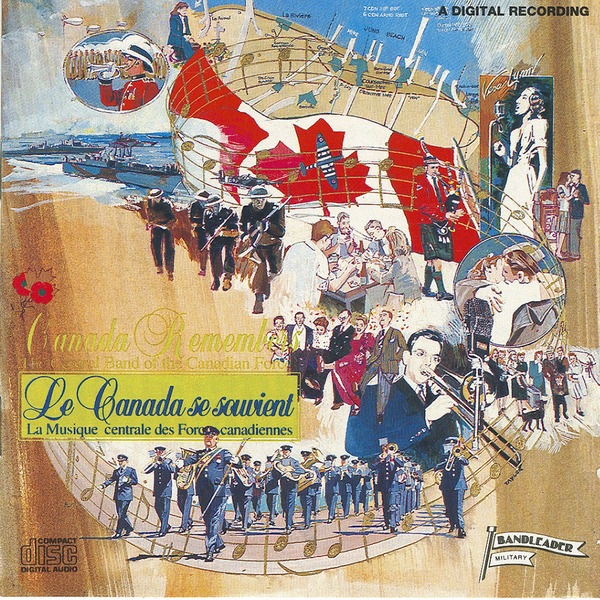
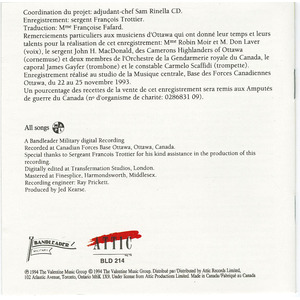
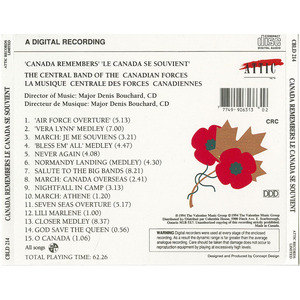
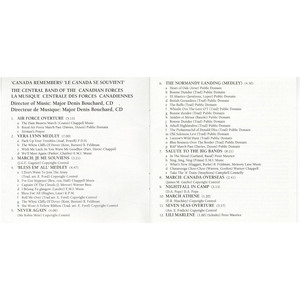

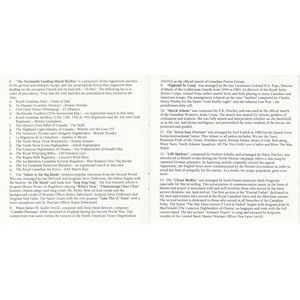
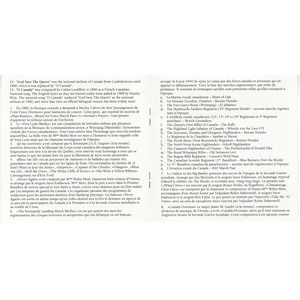

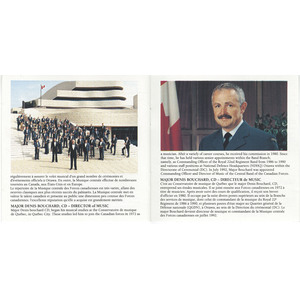
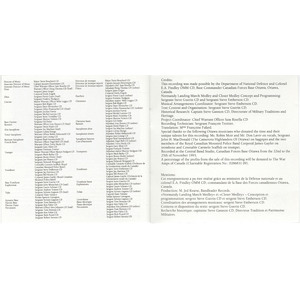

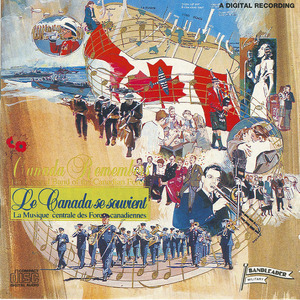
No Comments